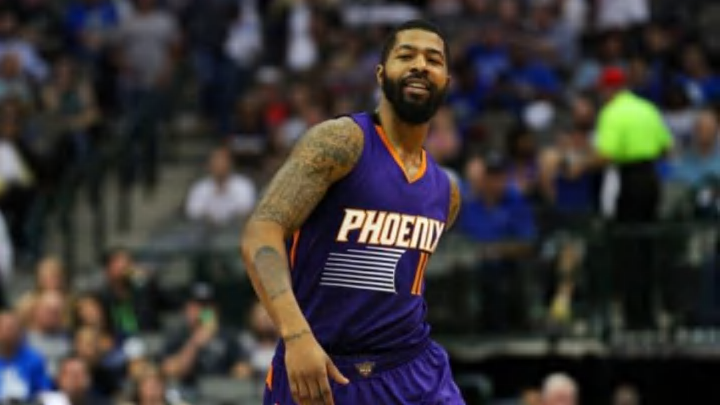After a disastrous season opener, the Phoenix Suns have gone 2-1 over their last three games. Though the two victories have come against the talent-deprived Portland Trail Blazers, the other loss was a hard-fought, six-point defeat at the hands of the Los Angeles Clippers — a team that many project to be a legitimate title contender in the West.
So far, it’s hard to get a proper read on the Suns, but it appears one thing is true: on any given night, they’re capable of playing well enough to compete with anyone as much as they’re capable of playing poorly enough to lose to anyone.
After theoretically improving the roster in so many different ways this offseason, the path to consistency still starts with the Suns’ biggest problem over the summer: Markieff Morris.
Four games into the season, Keef has gotten off to a bit of a rocky start. He’s averaging 12.8 points, 6.5 rebounds and 1.3 assists per game, which isn’t “terrible,” per se, but even as he’s putting up career highs in rebounding, his scoring numbers are a significant drop-off from the 15.3 points per game he averaged last season.
Those four games represent a tiny sample size, but Morris has really struggled with his shot in each and every contest so far, going 20-for-62 from the field (32.3 percent) to start the 2015-16 campaign.

Though he’s shooting a career-best 35.3 percent from three-point range after talking about how he spent his summer improving his efficiency from downtown, the Suns need him to start putting up more efficient shooting lines than the 1-for-6, 6-for-17, 6-for-17 and 7-for-22 outings he’s had thus far.
Maybe the summer departure of twin brother Marcus Morris still has him down. Maybe his relationship with the Suns is still toxic behind the scenes. Maybe hearing the boos peppered in from the home crowd during starting intros has affected him. Maybe those were just a couple of off shooting nights.
But whatever the case, the Suns are ready for him to prove he can still score efficiently without brother Mook around.
More from Hoops Habit
- 7 Players the Miami Heat might replace Herro with by the trade deadline
- Meet Cooper Flagg: The best American prospect since LeBron James
- Are the Miami Heat laying the groundwork for their next super team?
- Sophomore Jump: 5 second-year NBA players bound to breakout
- NBA Trades: The Lakers bolster their frontcourt in this deal with the Pacers
In Keef’s defense, Phoenix’s atrocious debut — a fluke-ish night that the team understandably decided to throw out the window — has skewed his averages so far. In that game, Morris was unable to get in a rhythm due to early foul trouble, and even when he took the floor for the second half, a couple of bad decisions saw him log five fouls in only 11 minutes of action.
Throw out that game and Keef’s numbers jump to 15.7 points and 8.3 rebounds per game, though his field goal percentage would still be an uninspiring 33.9 percent. That poor performance can’t be simply dismissed simply as “foul trouble,” however, since that’s been a consistent problem for Keef so far. He’s currently averaging 3.8 fouls in just 26.3 minutes per game, which translates to about 5.2 fouls per 36 minutes.
Coming off a season in which he averaged 31.5 minutes per game, it’s fair to say that averaging around four or five fouls a night would be an issue that could hinder his minutes and therefore, the team’s success.
But in any case, it’s far too early to worry about Keef’s ugly 32.3 field goal percentage. Though he hasn’t been hitting his normal shots from the midrange in isolation sets (or anywhere, for that matter), Morris is too talented as a scorer to let his early shooting struggles become a season-long trend.
At the very least, Phoenix should be encouraged by Keef’s most recent second half against the Clippers. Though he started the game 1-for-11 in the first half, his 15-point, 6-for-11 performance in the second half helped the Suns make it a close game until the very end.
This team doesn’t need to rely on Markieff Morris isolation plays with their vastly improved passing, but Keef isos notwithstanding, the Suns have still outscored opponents by 11.8 points per 100 possessions with Markieff Morris on the floor, according to NBA.com.
Next: NBA Power Rankings: Week 2
As the Suns look to start the 2015-16 season off on a positive note thanks to eight of their first 11 games being at home, it’s only a matter of time before Keef shakes off the bad summer vibes and starts playing good basketball again. And once the shots start falling, perhaps the fan support will come as well for a player who’s intrinsic to the team’s playoff hopes.
